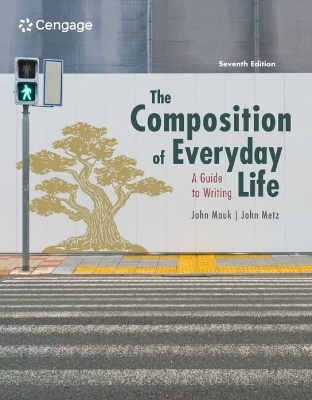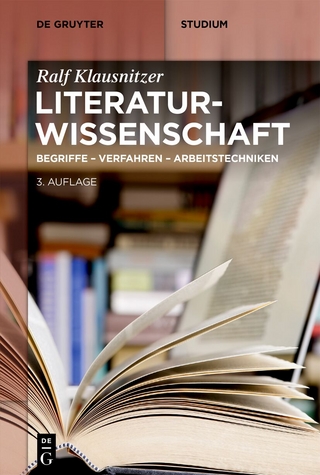
The Composition of Everyday Life
Wadsworth Publishing Co Inc (Verlag)
978-0-357-94583-4 (ISBN)
John Metz began teaching college writing as a graduate student at the University of Toledo in 1983. He then taught at University of Toledo, Umpqua Community College and Kent State University over the next forty years. He focused on helping students learn to invent ideas, make appropriate rhetorical decisions and redefine what writing is or can be. His students sometimes said, “I thought this was supposed to be a writing course.” John Mauk, Ph.D., has a doctorate in rhetoric and writing from Bowling Green State University and a master's degree in language and literature from the University of Toledo. Over a 24-year career, he taught composition at Owens Community College, Northwestern Michigan College and Miami University. He was twice named professor of the year. He now writes in various genres, edits manuscripts for professional writers and teaches in continuing education programs. He also hosts Prose from the Underground, a video series featuring interviews and practical advice for working writers.
Contents
Using CEL as a Thematic Reader
Note to Instructors
Acknowledgments
Chapter 1 Inventing Ideas
Introduction
Asking Questions
Re-Inventing Education
Reading for Rhetoric
Part I: Invention
Sample Essays
Writing Topics
Invention
Point of Contact
Analysis 1
Public Resonance
Thesis
Rhetorical Tools
Revision and Peer Review
Reflection
Part II: Research
Part III: Organization and Delivery
A Final Note on Artificial Intelligence and Practicing Writing
Inventing Ideas Assignment
Chapter 2 Remembering Who You Were
Introduction
Readings
“Selling Manure“ Bonnie Jo Campbell
“How I Lost the Junior Miss Pageant“ Cindy Bosley
“The Thrill of Victory . . . The Agony of Parents“ Jennifer Schwind-Pawlak
(Student Essay)
Invention
Point of Contact
Analysis ? Thinking Further
Public Resonance
Thesis ? Evolution of a Thesis ? Common Thesis Problem: Avoiding Clichés
? Revising Your Thesis
Rhetorical Tools ? Narration ? Allusions ? Dialogue
Revision ? Peer Review ? Peer Review Truisms
Reflection
Beyond the Essay: Invention Video
Chapter 3 Explaining Relationships
Introduction
Readings
“What the Honey Meant“ Cindy Bosley
“Dog-Tied“ David Hawes
“Mugged“ Jim Crockett
“To Fish and Be Fished: A Tinder-fied Game of Love“ Kellie Coppola
(Student Essay)
Invention
Point of Contact
Analysis ? Thinking Further
Public Resonance
Thesis ? Evolution of a Thesis
Rhetorical Tools ? Using Narration ? Using Description ? Using Figurative
Language
Revision ? Peer Review
Reflection
Beyond the Essay: Images as Support
Chapter 4 Observing
Introduction
Readings
“Onward, Gamers, Onward” Royce Flores
“The Front Porch“ Chester McCovey
“Red Raiders Fans“ Taylor Perry
Invention
Point of Contact ? Observing People ? Observing a Place ? Observing
an Animal ? Observing a Person or Event Involved in Your Major
Analysis ? Thinking Further
Public Resonance ? Invention Workshop
Thesis ? Evolution of a Thesis
Rhetorical Tools ? Using Details ? Using Narrative ? Using Allusions ? Using
Simile and Metaphor
Revision ? Peer Review
Reflection
Beyond the Essay: Cover Image
Chapter 5 Analyzing Concepts
Introduction
Readings
“Why ‘Natural’ Doesn’t Mean Anything Anymore” Michael Pollan
“Black Like I Thought I Was“ Erin Aubry Kaplan
“What Does It Mean to Live the Good Life?“ Emerys Westacott
“The Real, the Bad, and the Ugly“ Cassie Heidecker (Student Essay)
Outside Reading
Invention
Point of Contact
Analysis ? Thinking Further
Public Resonance
Thesis ? Evolution of a Thesis
Rhetorical Tools ? Examples ? Definitions and References ? Invention
Workshop ? Outside Sources
Revision ? Peer Review
Reflection
Beyond the Essay: Conceptual Map
Chapter 6 Analyzing Written Texts
Introduction
Readings
“The Default Setting: An Analysis of David Foster Wallace” Adrienne Carr
“Kurt Vonnegut’s ‘The Noodle Factory’” Clayton Tarantino (Student Essay)
“Seattle’s Rhetoric” Andrew Buchner (Student Essay)
Invention
Point of Contact
Analysis ? Thinking Further
Thesis ? Evolution of a Thesis
Rhetorical Tools ? Caution: Four Common Pitfalls
Reflection
Revision ? Peer Review
Beyond the Essay
Chapter 7 Analyzing Images and Videos
Introduction
Readings
“Rise of the Image Culture: Re-Imagining the American Dream”
Elizabeth Thoman
“An Imperfect Reality“ Rebecca Hollingsworth
“Look on My Works: Breaking Bad’s Final Season Trailer“ Nick Fendinger
(Student Essay)
Invention
Point of Contact ? Print Advertisements ? Posters ? Internet Images
? Billboards
Analysis ? Image ? Video ? Text ? Context
Thesis ? Common Thesis Problems ? Evolution of a Thesis ? Revising Your
Thesis
Rhetorical Tools ? Research
Revision ? Peer Review
Reflection
Beyond the Essay: Video Briefing
Chapter 8 Making Arguments
Introduction
Readings
“How ChatGPT Robs Students of Motivation to Write and Think for Themselves”
Naomi S. Baron
???The Dog Delusion“ April Pedersen
“In Defense of Darkness“ Holly Wren Spaulding
“Hive Talkin’: The Buzz around Town about Bees“
Teresa Scollon
Invention
Point of Contact ? School ? Work ? Home ? Community ? Pop Culture
? Your Major
Analysis ? Thinking Further
Public Resonance
Thesis ? Arguability ? Scope ? Public Resonance ? Revelation ? Evolution of
a Thesis ? Common Thesis Problems
Rhetorical Tools ? Support ? Counterargument ? Concession and Qualifier
? Caution: Logical Fallacies
Revision ? Peer Review
Reflection
Beyond the Essay: The Open Letter
Chapter 9 Responding to Arguments
Introduction
Readings
“For the Sake of Frenzy” Kelly Smith
“AI Can Save Writing by Killing the College Essay”
Steven D. Krause
“The Power of Failure: J. K. Rowlings’ Harvard Commencement Speech“
Liz Winhover (Student Essay)
Invention
Point of Contact
Analysis ? The First Layer: The Four Elements of Argument ? The Second Layer:
Warranting Assumptions
Public Resonance
Thesis ? Evolution of a Thesis ? Thinking Further
Rhetorical Tools ? Using Support ? Counterarguing ? Conceding and
Qualifying Points ? Remembering Logical Fallacies
Revision ? Peer Review
Reflection
Beyond the Essay: Tattoo Design
Chapter 10 Evaluating
Introduction
Readings
“Talibanned” Benjamin Busch
“Important and Flawed“ Kareem Abdul-Jabbar
“Star Trek: Where No Man Has Gone Before“ Jaren Provo (Student Essay)
Invention
Point of Contact
Analysis ? Discovering the Purpose of the Subject ? Applying Criteria to the
Subject
Public Resonance
Thesis ? Evolution of a Thesis ? Common Thesis Problems
Rhetorical Tools ? Using Support ? Counterarguments and Concessions
Revision ? Peer Review
Reflection
Beyond the Essay: Evaluation Form
Chapter 11 Searching for Causes
Introduction
Readings
“Is Google Making Us Stupid? What the Internet Is Doing to Our Brains” Nicholas
Carr
“Why We Binge-Watch Television“ Kevin Fallon
“Why are So Many Gen Z-ers Drawn to Old Digital Cameras?“ Tim Gorichanaz
“Why can’t Americans Agree On, Well, Nearly Anything?“ James Steiner-Dillon
Invention
Point of Contact ? Work ? Local Events ? Social Trends ? Campus Issues
? Politics ? Your Major
Analysis ? What State of Mind or Psychological Need May Have Led to the
Phenomenon? ? Thinking Further
Public Resonance
Thesis ? Evolution of a Thesis ? Common Thesis Problems ? Revising Your Thesis
Rhetorical Tools ? Integrating Authorities (Outside Sources) ? Counterarguing
and Conceding
Revision ? Peer Review
Reflection
Beyond the Essay: Photo Essay
Chapter 12 Proposing Solutions
Introduction
Readings
“Hi, I’m a Digital Junkie, and I Suffer from Infomania” Manoush Zomorodi
“Yelling at Referees“ Jordan Franco
“Every Teacher Grades Differently, Which Isn’t Fair“ Laura Link
“Can Silent Retreats Solve Generation Z’s Problems?“ Nicholas Punla Smith
Invention
Point of Contact ? School ? Government ? Television ? Your Major
? Community
Analysis
Public Resonance
Thesis ? Evolution of a Thesis
Rhetorical Tools ? Discovering Counterarguments and Alternative Solutions
? Avoiding Logical Fallacies
Revision ? Peer Review
Reflection
Beyond the Essay: Exploring Other Media
Chapter 13 Thinking Radically: Reseeing the
World
Introduction
Readings
“Warfare: An Invention—Not a Biological Necessity“ Margaret Mead
“Build the Wall“ Ed Bell
“As the Global Musical Phenomenon Turns , a Hip-Hop Professor Explains What the
Word ‘Dope’ Means to Him“ A.D. Carson
“Unemployed and Working Hard“ Simon Wykoff (Student Essay)
Outside Reading
Invention
Point of Contact
Analysis ? Thinking Further
Public Resonance
Thesis ? Evolution of a Thesis
Rhetorical Tools ? Using Narration ? Using Description ? Building Intellectual
Bridges ? Counterarguments and Concessions ? Outside Sources
Revision ? Peer Review
Reflection
Beyond the Essay: Visual Essay/Collage/Poster
Chapter 14 Finding Sources
Using Catalogs and Databases
Online Catalogs
Periodical Databases
Readings
“AI Information Retrieval: A Search Engine Researcher Explains the Promise and Peril
of Letting ChatGPT and Its Cousins Search the Web for You“ Chirag Shaw
Asking the Right Questions
Conducting Interviews
Integrating Interviews into Your Writing
Planning an Interview
Generating Questions
Creating Surveys
Choosing Respondents
Recording and Using Responses
Chapter 15 Analyzing, Synthesizing, and Evaluating
Sources
Developing Critical Literacy
“Just the Facts, Please”— Or Maybe Not
“Numbers Don’t Lie”—Or Do They?
Summarizing and Analyzing Sources
Content
Context
Understanding Common Source Types
Books and e-books
Periodicals
Newspapers
Government documents
Reference works
Audiovisual materials
Synthesizing Sources
Assignment: Annotated Bibliography
Sample Annotated Bibliography
Evaluating Sources
Relevance
Reliability
Credibility
Timeliness
Diversity
Evaluating Online Sources ? Considering Generative AI Chatbots
? Considering AI-Generated Content
Assignment: Evaluating a Source ? Relevance ? Reliability ? Credibility
? Timeliness ? Diversity
Sample Source Evaluation
Assessing Bond Pittman’s “Drink Earlier, Drink Less”
Chapter 16 Integrating and Documenting
Sources
Integrating Sources
Paraphrase
Summary
Quotation ? Special Conditions in Quoting
Coherence Strategies
Plagiarism
Documenting Sources
MLA Style
In-Text Citation
Works Cited
Books ? Single Author Print Book ? Book with Two Authors ? Book with Three
or More Authors ? Corporate Author or Government Publication ? Subsequent
Editions ? Republished Book ? Edited Book ? Translated Book ? Online Book
? E-book
Articles ? Article in a Magazine ? Article in a Print Journal ? Article in Online
Journal ? Journal Article Retrieved from a Database ? Article in a Print Newspaper
? Newspaper or Magazine Article Retrieved from a Database ? Essay, Story, or
Poem in an Anthology (such as a college textbook) ? Encyclopedia Article
Online-Only Sources ? Official Website ? Personal or Professional Home Page
? Document or Page from Website ? Government Website ? Online Presentation
? E-mail ? Online Posting ? Untitled Online Posting ? Entry in an Online
Encyclopedia or Dictionary ? Information from an AI Chatbot
Other Sources ? Abstract ? Television Episode ? Film ? Film or Television
Episode, Accessed Online ? Audio Recording ? Personal Interview ? Published
Letter ? Print Brochure ? Print Advertisement ? Work of Art (painting, sculpture,
photograph) ? Lecture or Speech ? Performance
APA Style
In-Text Citation
References
Printed Books ? General Format for Books ? Two or More Authors ?
Corporate Author ? Subsequent Editions ? Edited Book ? Translated Book
Printed Articles ? Article in a Magazine ? Article in a Newspaper ? Article in a
Journal ? Article or Chapter in an Edited Book ? Encyclopedia Article
Electronic Sources ? Website ? Document from Website (Author and Date
Stated) ? Document from Website (No Author and/or Date Stated) ? Blog Post
? Journal or Magazine Article Retrieved from a Database ? Journal Article Online
? Online Presentation ? Online Book ? Abstract ? Information from an AI Chatbot
Other Sources ? Brochure ? Personal Interview or Letter ? Television Program
? Government Publication
Frequently Asked Questions ? What If I Don’t Know What Type of Source I
Have? ? How Do I Tell the Difference between a Journal and a Magazine? ? How
Do I Find the Publication Information? ? How Do I Know the Page Numbers of an
Electronic Source? ? Should I Use APA, MLA, or Something Else? ? Why Are There
Different Documentation Styles? ? Why Don’t Some Articles Have Works Cited or
Reference Pages? ? Standard Abbreviations
Chapter 17 Organizing Ideas
Introduction
Beginning
Changing Paragraphs
Integrating Outside Sources
Counterarguing
Separating Problems and Solutions
Concluding
Questions for Organizing
Chapter 18 Developing Voice
Introduction
Establishing Presence
Choosing Details
Controlling Speed and Time
Managing the “I”
Using Allusions
Promoting Curiosity
Using Figurative Language
Whispering (Drawing Readers in Close)
Yelling (Emphasizing Points)
Using Sentence Length
Building Credibility
Drawing on Experience
Arguing, Conceding, and Qualifying
Avoiding Harsh Description
Talking with, Not Arguing at, Readers
Applying Rogerian Argument
Creating Reasonable Tone
Following Conventions
Considering Verb Mood
Adjusting Formality
Exploring the Boundaries
Questions for Developing Voice
Chapter 19 Vitalizing Sentences
Introduction
Controlling the Pace
Turn Clauses to Phrases
Turn Phrases to Words
Combine Sentences
Subordinate Less Important Ideas
Experiment with Length
Avoid Unnecessary Interruption
Avoid Over-Embedding
Avoid Pileups
Avoid Vague Pronouns
Cleaning the Language
Avoid Clichés
Avoid Stilted Language
Avoid Unnecessary Attention to I
Avoid Unnecessary Attention to You
Clean Up Attributive Phrases
Avoid Blueprinting
Condense Wordy Phrases
Avoid Expletives
Throw Away the Obvious
Getting Specific
Vitalize with Verbs
Avoid Be Verbs When Possible
Experimenting with Patterns
Repeat Clause or Phrase Patterns
Intensify with a Series
Try Absolutes!
Try the Stylistic Fragment ? Stylistic Fragments
Deliberately Break a Rule!
Questions for Vitalizing Writing
Online Chapters
Chapter 20 Additional Readings
Chapter 21 Rhetorical Handbook
Index
| Erscheinungsdatum | 05.03.2024 |
|---|---|
| Verlagsort | Belmont, CA |
| Sprache | englisch |
| Maße | 204 x 255 mm |
| Gewicht | 1134 g |
| Themenwelt | Schulbuch / Wörterbuch ► Wörterbuch / Fremdsprachen |
| Geisteswissenschaften ► Sprach- / Literaturwissenschaft ► Literaturwissenschaft | |
| Geisteswissenschaften ► Sprach- / Literaturwissenschaft ► Sprachwissenschaft | |
| Sozialwissenschaften ► Pädagogik ► Erwachsenenbildung | |
| ISBN-10 | 0-357-94583-2 / 0357945832 |
| ISBN-13 | 978-0-357-94583-4 / 9780357945834 |
| Zustand | Neuware |
| Informationen gemäß Produktsicherheitsverordnung (GPSR) | |
| Haben Sie eine Frage zum Produkt? |
aus dem Bereich


